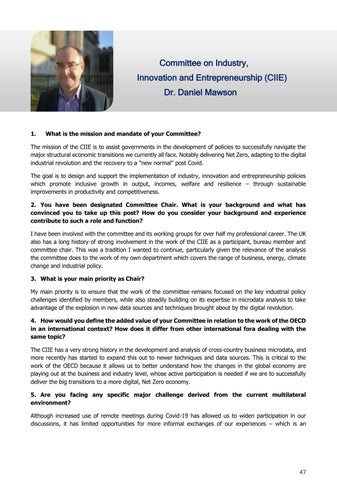Committee on Industry, Innovation and Entrepreneurship (CIIE) Dr. Daniel Mawson
1.
What is the mission and mandate of your Committee?
The mission of the CIIE is to assist governments in the development of policies to successfully navigate the major structural economic transitions we currently all face. Notably delivering Net Zero, adapting to the digital industrial revolution and the recovery to a "new normal" post Covid. The goal is to design and support the implementation of industry, innovation and entrepreneurship policies which promote inclusive growth in output, incomes, welfare and resilience – through sustainable improvements in productivity and competitiveness. 2. You have been designated Committee Chair. What is your background and what has convinced you to take up this post? How do you consider your background and experience contribute to such a role and function? I have been involved with the committee and its working groups for over half my professional career. The UK also has a long history of strong involvement in the work of the CIIE as a participant, bureau member and committee chair. This was a tradition I wanted to continue, particularly given the relevance of the analysis the committee does to the work of my own department which covers the range of business, energy, climate change and industrial policy. 3. What is your main priority as Chair? My main priority is to ensure that the work of the committee remains focused on the key industrial policy challenges identified by members, while also steadily building on its expertise in microdata analysis to take advantage of the explosion in new data sources and techniques brought about by the digital revolution. 4. How would you define the added value of your Committee in relation to the work of the OECD in an international context? How does it differ from other international fora dealing with the same topic? The CIIE has a very strong history in the development and analysis of cross-country business microdata, and more recently has started to expand this out to newer techniques and data sources. This is critical to the work of the OECD because it allows us to better understand how the changes in the global economy are playing out at the business and industry level, whose active participation is needed if we are to successfully deliver the big transitions to a more digital, Net Zero economy. 5. Are you facing any specific major challenge derived from the current multilateral environment? Although increased use of remote meetings during Covid-19 has allowed us to widen participation in our discussions, it has limited opportunities for more informal exchanges of our experiences – which is an
47
















